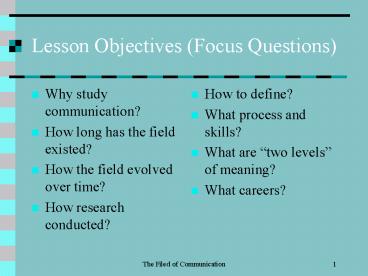Lesson Objectives (Focus Questions) - PowerPoint PPT Presentation
1 / 15
Title:
Lesson Objectives (Focus Questions)
Description:
Ancient Philosophers-Plato, Aristotle & Isocrates: Rhetoric as Central to Civic Life ... Meanings: created by symbols through interactions. Content level of meaning ... – PowerPoint PPT presentation
Number of Views:24
Avg rating:3.0/5.0
Title: Lesson Objectives (Focus Questions)
1
Lesson Objectives (Focus Questions)
- Why study communication?
- How long has the field existed?
- How the field evolved over time?
- How research conducted?
- How to define?
- What process and skills?
- What are two levels of meaning?
- What careers?
2
What Mike Does in a Day
- E-Mail vs. Communication in Person
- Individual vs. Team
- Creating Climate
- Planning Interviews
- Date (Relationship)
- Speech to a Group
3
Importance of Communication
- We talk, listen, think, ask, answer, share ideas
So much communication in a day. - Personal Life
- Building Personal Identity
- Promoting Health
- Personal Relationships
- Marriage
- Family, Parent-child, Friends,
4
Importance of Communication (2)
- Professional Life
- Critical for Career Success (Talk Listen)
- Express Ideas, Giving Gaining Support, Gaining
Cooperation - Civic Life
- For the the Health of Society
- Required for Democracy
- Expressing Ideas, Claiming, Presenting Listen
to Argument
5
History of the Field
- Began more than 2500 yrs ago
- Rhetoric and Democratic Life
- Rhetoric born mid-400s B.C. on Isle of Syracuse
- Ancient Philosophers-Plato, Aristotle
Isocrates - Rhetoric as Central to Civic Life
- Teaching Citizens Analyze Listeners, Discover
Ideas, Organize Messages, Develop Proof, and
Deliver Speeches - Aristotles 3 Cornerstones of Persuasion Ethos,
Pathos, Logos - After WW I II
- Social Issues Prejudice, Propaganda, Attitude
Belief Changes
6
History of the Field (2)
- Liberal Education
- Public speaking taught in colleges (Europe U.S)
- Dewey Progressive thinking and citizen
participation - After WW I II
- Social Issues Prejudice, Propaganda, Attitude
Belief Changes
7
History of the Field (3)
- Mid- 20th Century
- Scientific, empirical research gaining prominence
- Research Professional Groups
- 1960-70
- Civil Rights, Womens Movement, Interpersonal
Communication - Michel Foucault (French)
- Ideas about Power
8
Research in Communication
- Quantitative Research
- Descriptive Statistics, Survey, Experiment
- Qualitative Research
- Looking into meaning, function
- Textual Analysis, Ethnography, Historical Study
- Critical Research
- Identify Challenge Communication Practices
- To Advance Social Awareness
9
Defining Communication
- Communication as a systemic process in which
people interact with and through symbols to
create and interpret meanings - Features
- Process dynamic and ever-changing
- Systemic interrelated parts, context,
surroundings - Symbolic abstract, arbitrary, ambiguous
representations - Meanings created by symbols through interactions
- Content level of meaning
- Relationship level of meaning
10
Models of Communication
- Linear Models (p. 23)
- Laswell (1948) Who Says What in What Channel to
Whom with What Effect? - Shannon Weaver (1949) Noise introduced
- Interactive Models (p. 24)
- Schramm (1955) Feedback added
- Transactional Models (p. 25)
- Wood (1997) Non-sequential, simultaneous,
changing over time
11
Breadth of the Field
- Intrapersonal Communication
- self-talk, thinking
- Interpersonal Communication
- between people
- Performance Studies
- performing personal, professional, social
identities - Group Team Communication
- leadership, roles, group goals, cohesion (fantasy
themes)
12
Breadth of the Field (2)
- Public Communication
- speak to others, credibility, persuasion
- Organizational Communication
- leadership, commitment, decision making,
organizational culture - Mass Communication
- media, stereotypes
13
Breadth of the Field (3)
- Technologies of Communication
- human community, information knowledge
- Intercultural Communication
- meanings cultures
- Ethics and Communication
- relationships, rights, moral principles
14
Unifying Themes and Processes
- Unifying Themes
- Symbolic activities
- Meaning
- Ethics
- Basic Processes
- Perceiving Understanding
- Creating Interaction Climates
- Engaging in Verbal Communication
- Engaging in Non-verbal Communication
- Listening Responding
- Adapting to Contexts
15
Careers in Communication
- Research
- Education
- Mass Communication
- Training Consulting
- Human Relations, Human Development Management

